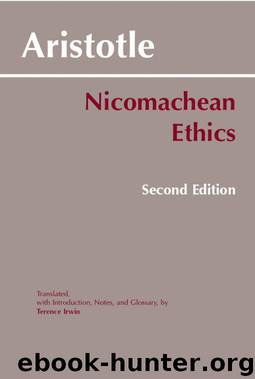Nicomachean Ethics (Hackett Classics) by Aristotle

Author:Aristotle
Language: eng
Format: mobi
Tags: ebook, book
Publisher: Hackett Publishing Company, Inc.
Published: 1999-11-30T14:00:00+00:00
7
7.§1–8. A new approach to the good should avoid these objections to other views. We begin from plausible criteria for the good, and we find that happiness meets these criteria.
(a) §1. The good is the ultimate end.
§1 But let us return … could be: Aristotle begins from the diversity of goods that we must recognize when we reject the Platonic attempt to find unity in goods. He wants to show that this diversity does not require us to reject unity in the human good.
For it is apparently … other actions: This description of different goods recalls the reference to analogy in 6.§12. After these illustrations of diversity in goodness, Aristotle focuses (in ‘but in every action and decision … ’) on the aspect of unity in the different cases.
And so, … these ends: The first part of this sentence repeats the conclusion drawn at the beginning of ch. 2 above. The second part, allowing the possibility of many goods constituting the end, helps to explain why the beginning of ch. 2 was expressed in conditional form. Aristotle now makes it clear that he has not proved that there is just one end of human action. Instead of ‘[the good achievable in action’] one might prefer ‘[the goods … ]’.
(b) §2–5. The good is complete.
§2 Our argument, … conclusion: Aristotle seems to refer back to the conclusion reached at the beginning of i 2; see previous note. He has reached the conclusion by a different route, since he has now relied only on the connection between ends and goods (beginning from the points about analogy in ch. 6), and has said nothing about the hierarchy of ends that he introduced in ch. 1. So far he has not chosen between the two possibilities mentioned at the end of §1.
But we must … perspicuous: More perspicuity is needed, because ch. 2 simply referred to some hierarchies of ends, and did not explain why we must recognize a single end. In §3–8, Aristotle tries to explain this point, by arguing that (1) the good satisfies some formal criteria (see note to i 5.§1), and (2) happiness is the good, 1095a17, because it satisfies these criteria. They are formal criteria because Aristotle thinks (cf. Plato, Phil. 20d, and note to x 2.§3) they are reasonable conditions for us to apply to the good even before we consider the claims of specific candidates claiming to be the good.
The formal criteria require the good to be (a) complete (§3–5), (b) self-sufficient (§6–7), and (c) most choiceworthy (§8), not counted as one good among many. Here (a) follows from our choosing the good only for its own sake and not also for the sake of something else; if there were some more complete end than the good, we would choose the good for the sake of that. The other two criteria explain what is required by completeness.
§3 Since there are … ends are complete: See HAPPINESS (2). ‘Complete’ renders teleion, cognate with telos, ‘end’. Some prefer to translate teleion by ‘final’ or ‘perfect’.
Download
This site does not store any files on its server. We only index and link to content provided by other sites. Please contact the content providers to delete copyright contents if any and email us, we'll remove relevant links or contents immediately.
| Anthropology | Archaeology |
| Philosophy | Politics & Government |
| Social Sciences | Sociology |
| Women's Studies |
The remains of the day by Kazuo Ishiguro(8999)
Tools of Titans by Timothy Ferriss(8396)
Giovanni's Room by James Baldwin(7346)
The Black Swan by Nassim Nicholas Taleb(7129)
Inner Engineering: A Yogi's Guide to Joy by Sadhguru(6796)
The Way of Zen by Alan W. Watts(6614)
The Power of Now: A Guide to Spiritual Enlightenment by Eckhart Tolle(5782)
Asking the Right Questions: A Guide to Critical Thinking by M. Neil Browne & Stuart M. Keeley(5775)
The Six Wives Of Henry VIII (WOMEN IN HISTORY) by Fraser Antonia(5515)
Astrophysics for People in a Hurry by Neil DeGrasse Tyson(5190)
Housekeeping by Marilynne Robinson(4447)
12 Rules for Life by Jordan B. Peterson(4304)
Ikigai by Héctor García & Francesc Miralles(4274)
Double Down (Diary of a Wimpy Kid Book 11) by Jeff Kinney(4272)
The Ethical Slut by Janet W. Hardy(4253)
Skin in the Game by Nassim Nicholas Taleb(4249)
The Art of Happiness by The Dalai Lama(4130)
Skin in the Game: Hidden Asymmetries in Daily Life by Nassim Nicholas Taleb(4007)
Walking by Henry David Thoreau(3962)
